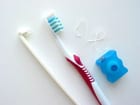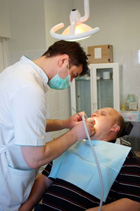 There is no feeling quite as clean as that of just having had your teeth cleaned by a dentist or dental hygienist. No mater how thoroughly you brush and floss at home you can never get that ‘straight from the dentist’ clean feeling. Dentists and hygienists use techniques known as scaling and polishing to clean teeth as thoroughly as possible, which while sometimes a little unpleasant, are very necessary to keep teeth healthy.
There is no feeling quite as clean as that of just having had your teeth cleaned by a dentist or dental hygienist. No mater how thoroughly you brush and floss at home you can never get that ‘straight from the dentist’ clean feeling. Dentists and hygienists use techniques known as scaling and polishing to clean teeth as thoroughly as possible, which while sometimes a little unpleasant, are very necessary to keep teeth healthy.
Scaling involves the careful use of the ominous looking little scaling hook to remove hardened plaque, commonly called tartar from the teeth. Plaque itself can be removed at home by brushing and flossing, but in hard to reach places it can often become hard. It is necessary to remove plaque and tartar as they cause inflammation of the gums and dental decay, both of which can cause nasty infections and ultimately tooth loss. Tartar is very difficult to remove and needs the skilful use of scaling by the dentist to scrape from the surface of the tooth.
Polishing is the process of thoroughly cleaning the surface of the teeth usually using an electric polisher. This smoothes the surface of the enamel, removing plaque and minor stains. This makes the teeth feel very clean and smooth and makes it difficult for plaque to cling to the surface of the teeth. City of Leeds dentists offer scaling and polishing as part of a regular dental check up pr hygiene appointment to help keep teeth as clean and healthy as possible. They are two of the simplest yet most effective ways to keep teeth free form the damage caused by plaque and tartar.





 Even the most beautifully straight teeth can be let down by discolouration. The yellowing of teeth is something that happens naturally with age and can be accelerated by lifestyle choices such as smoking and drinking very dark liquids like wine and coffee. The discolouration of teeth can be slowed by effective cleaning and a strict regime of oral hygiene but teeth will ultimately begin to lose their natural colour at some point.
Even the most beautifully straight teeth can be let down by discolouration. The yellowing of teeth is something that happens naturally with age and can be accelerated by lifestyle choices such as smoking and drinking very dark liquids like wine and coffee. The discolouration of teeth can be slowed by effective cleaning and a strict regime of oral hygiene but teeth will ultimately begin to lose their natural colour at some point. Periodontal disease, often commonly referred to as gum disease, is seen in two degrees of severity. Milder gum disease is called gingivitis and involves a mild inflammation of the gum tissue. It is estimated that three quarters of all adults in the UK will experience some gingivitis at some point. It is usually easily remedied by improved oral hygiene and some treatment from a dentist. The other more serious form of gum disease is called periodontitis and requires much more substantial treatment. It usually stems from a failure to address or treat the milder form of the disease and can cause significant dental problems such as infections and tooth loss. In fact, periodontitis is responsible for more tooth loss in the UK than tooth decay.
Periodontal disease, often commonly referred to as gum disease, is seen in two degrees of severity. Milder gum disease is called gingivitis and involves a mild inflammation of the gum tissue. It is estimated that three quarters of all adults in the UK will experience some gingivitis at some point. It is usually easily remedied by improved oral hygiene and some treatment from a dentist. The other more serious form of gum disease is called periodontitis and requires much more substantial treatment. It usually stems from a failure to address or treat the milder form of the disease and can cause significant dental problems such as infections and tooth loss. In fact, periodontitis is responsible for more tooth loss in the UK than tooth decay. It is never too late to improve the appearance of your teeth and this doesn’t necessarily mean shelling out thousands of pounds for expensive cosmetic dentistry. There are many things you can do at home or small dental procedures that can make your teeth look cleaner and healthier.
It is never too late to improve the appearance of your teeth and this doesn’t necessarily mean shelling out thousands of pounds for expensive cosmetic dentistry. There are many things you can do at home or small dental procedures that can make your teeth look cleaner and healthier. With gum disease and tooth decay on the increase amongst children and adults in the UK, dentists are keen to stress the importance of effective teeth cleaning. For many people, cleaning their teeth simply involves giving them a quick brush in the morning when they get up and before they go to bed but a thorough dental hygiene routine should be so much more than that.
With gum disease and tooth decay on the increase amongst children and adults in the UK, dentists are keen to stress the importance of effective teeth cleaning. For many people, cleaning their teeth simply involves giving them a quick brush in the morning when they get up and before they go to bed but a thorough dental hygiene routine should be so much more than that. Many people’s answer to dealing with bad breath is to reach for the nearest bottle of mouthwash and have a gargle but is this the best solution to treating halitosis? It would seem that the answer is no. Indeed in the United States, after rigorous testing in the 1970s by the Food and Drug administration, mouthwash products are no longer allowed by law to claim that their products stop bad breath.
Many people’s answer to dealing with bad breath is to reach for the nearest bottle of mouthwash and have a gargle but is this the best solution to treating halitosis? It would seem that the answer is no. Indeed in the United States, after rigorous testing in the 1970s by the Food and Drug administration, mouthwash products are no longer allowed by law to claim that their products stop bad breath. The oral cavity is the gateway to the rest of the body. Air, water and food are all taken in through the mouth so it is fairly obvious that the mouth is going to have an affect on the rest of your body. In fact, the mouth can act as an indicator for overall bodily health as many medical conditions manifest symptoms in the mouth. In a similar way, oral conditions can have an affect on the rest of the body.
The oral cavity is the gateway to the rest of the body. Air, water and food are all taken in through the mouth so it is fairly obvious that the mouth is going to have an affect on the rest of your body. In fact, the mouth can act as an indicator for overall bodily health as many medical conditions manifest symptoms in the mouth. In a similar way, oral conditions can have an affect on the rest of the body. In recent years there has been a huge resurgence of interest in more traditional forms of medicine and herbal remedies. For many generations this information was either lost or ignored in favour of a more scientific approach but resent studies indicate that our ancestors may have been onto something and more and more people are keen to find out what it is.
In recent years there has been a huge resurgence of interest in more traditional forms of medicine and herbal remedies. For many generations this information was either lost or ignored in favour of a more scientific approach but resent studies indicate that our ancestors may have been onto something and more and more people are keen to find out what it is. The health of our teeth and gums is one aspect of the body we can almost fully control. The practice of actively seeking to avoid the problems of gum disease and tooth decay is commonly known as preventative dentistry. This involves your dentist working with you and the dental hygienist to develop a plan of treatment to best help you avoid these conditions.
The health of our teeth and gums is one aspect of the body we can almost fully control. The practice of actively seeking to avoid the problems of gum disease and tooth decay is commonly known as preventative dentistry. This involves your dentist working with you and the dental hygienist to develop a plan of treatment to best help you avoid these conditions. Over the counter teeth whitening products may be effective and convenient but they do not provide the same quality of treatment available at a Leeds dentist. Furthermore, there is a chance that if used incorrectly you could damage some of the soft tissue in the mouth because of the concentrated nature of the hydrogen peroxide in the whitening gel.
Over the counter teeth whitening products may be effective and convenient but they do not provide the same quality of treatment available at a Leeds dentist. Furthermore, there is a chance that if used incorrectly you could damage some of the soft tissue in the mouth because of the concentrated nature of the hydrogen peroxide in the whitening gel.

